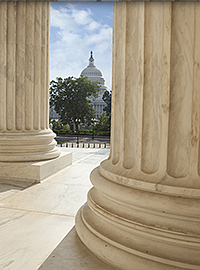| Supreme Court Confronts Anti-Democratic Administrative State |
 |
|
By Timothy H. Lee
Thursday, January 18 2024 |
Increasingly alarmed by Joe Biden’s record-low presidential approval ratings that somehow continue to deteriorate – this week brought more bad news with an ABC News poll showing him at just 33% – his electoral salvage team possesses few viable strategies beyond slurring former president Donald Trump as some sort of existential threat to democracy itself. That’s a rich Orwellian accusation coming from a party that ruthlessly works to prevent third-party No Labels candidates from appearing on presidential ballots this November, and to quash the primary challenge of fellow Democrat Congressman Dean Phillips. The strategy acquires additional irony on a week when federal prosecutors sought a five-year prison sentence against anti-Trump activist Charles Littlejohn, who joined the Internal Revenue Service (IRS) in 2017 for the sole purpose of accessing and leaking the private tax records of Trump himself. Deepening the irony, a United States Supreme Court shaped significantly by Trump heard two cases this week that may actually restore a more democratic balance to our system of governance by reclaiming powers from the unaccountable regulatory state. At issue this term in the companion cases of Relentless, Inc. v. Department of Commerce and Loper Bright Enterprises, Inc. v. Raimondo is a judicial creation known as “Chevron Deference.” Arising from its namesake 1984 Supreme Court decision in Chevron v. Natural Resources Defense Council, “Chevron Deference” refers to the wide deference granted to administrative agencies in cases where the text of a law in question is silent or arguably ambiguous. As an initial matter, that violates citizens’ due process rights by automatically tipping the judicial scales in favor of the government and against the citizen challenging the agency, when our system of justice demands that cases be resolved in a neutral forum by impartial judges. More broadly, “Chevron Deference” undermines democratic principles by allowing unelected and unaccountable bureaucrats at federal agencies to effectively create and interpret laws, as opposed to executing laws as our constitutional system requires. Granting such wide latitude shifts lawmaking authority from Congress, and it shifts interpretive powers away from courts. “Chevron Deference” thus violates the Constitution’s separation of powers, which grants “judicial power” to courts and envisions a judiciary that serves as a check on potentially abusive executive branch actions instead of simply deferring to them. As settled by Marbury v. Madison in 1803, “It is emphatically the province and duty of the judicial department to say what the law is.” “Chevron Deference” undermines that core judicial responsibility. It also violates the Administrative Procedure Act of 1946 itself, which demands that, “the reviewing court shall decide all relevant questions of law, interpret constitutional and statutory provisions, and determine the meaning and applicability of the terms of an agency action.” Moreover, “Chevron Deference” created a democratic accountability problem, since murky agencies became more free to expand statutes to create new rules and regulations without the type of scrutiny, debate and oversight that the legislative process allows. Whom can the American electorate expel from office when agencies abuse their authority and get things wrong? Whatever logic “Chevron Deference” possessed in 1984, the ensuing four decades have demonstrated that our federal bureaucracies are populated more by arrogant activists than benevolent technocrats. As Chief Justice John Roberts has observed, the “Framers could hardly have envisioned today’s ‘vast and varied federal bureaucracy’ and the authority administrative agencies now hold over our economic, social, and political activities.” In that vein, it’s no coincidence that according to the U.S. Census Bureau, the two wealthiest counties in America, and six of the top ten, surround the Washington, D.C. area. We are increasingly a nation run top-down by arrogant bureaucrats rewarded by stratospherically high-paying jobs immune from layoff or termination for poor performance. They govern our lives from on high, immune from democratic checks and balances. That is the epitome of anti-democratic. “Chevron Deference” concentrates power in increasingly powerful and expansive administrative agencies, bypassing elected representatives and eroding the Constitution’s system of checks and balances and separation of powers. By correcting its 1984 error, the Supreme Court can help restore the democratic principles that Biden and so many other critics claim to value. |
Related Articles : |
























